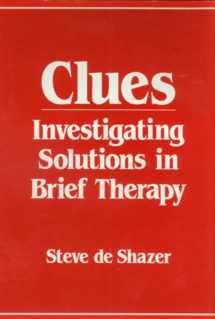
Clues: Investigating Solutions in Brief Therapy
Book details
Summary
Description
How do solutions develop? This question leads de Shazer to a provocative discussion of all the solution-related things that client and therapist do during a session, which ultimately point to a task that says, "Now that you know what works, do more of it."
Once therapist and client are focused on investigating solutions rather than problems, therapy inevitably becomes brief―sometimes only on session.
Engaging cases, often with surprising twists, illustrate this practice-based theory of brief therapy with a wide range of complaints. Some of these, such as drug addiction or severe marital record, previously have been thought to be too "difficult" for brief therapy. however, as de Shazer shoes time and again, once therapist and client together discover "what works," obstacles in the pathway to solutions disappear.
An innovation is de Shazer's computer analysis of therapy sessions, which provides a map for analyzing situations and finding solutions. Pieces of the computer program are highlighted with individual cases, enabling the reader to move easily from the map to the territory and back again.
Both theoretically stimulating and clinically sound, de Shazer's investigations turns up clues with the potential to revolutionize the way psychotherapy is thought about and practiced.


We would LOVE it if you could help us and other readers by reviewing the book
Book review





